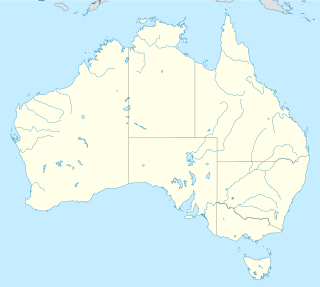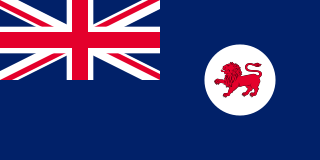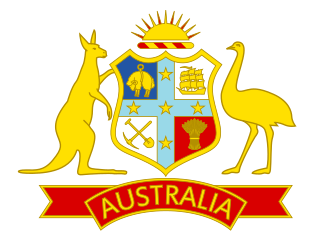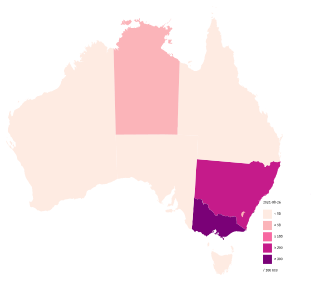Related Research Articles
The Australian Broadcasting Corporation (ABC) is Australia's national broadcaster, founded in 1929. It is principally funded by the direct grants from the Australian government but is expressly independent of government and partisan politics. The ABC plays a leading role in journalistic independence and is fundamental in the history of broadcasting in Australia.

New South Wales is a state on the east coast of Australia. It borders Queensland to the north, Victoria to the south, and South Australia to the west. Its coast borders the Coral and Tasman Seas to the east. The Australian Capital Territory is an enclave within the state. New South Wales' state capital is Sydney, which is also Australia's most populous city. In March 2019, the population of New South Wales was over 8 million, making it Australia's most populous state. Just under two-thirds of the state's population, 5.1 million, live in the Greater Sydney area. The demonym for inhabitants of New South Wales is New South Welshmen; but some have protested this term while there is no commonly accepted alternative.

Oceania is a geographic region that includes Australasia, Melanesia, Micronesia and Polynesia. Spanning the Eastern and Western Hemispheres, Oceania has a land area of 8,525,989 square kilometres (3,291,903 sq mi) and a population of over 41 million. When compared to continents, the region of Oceania is the smallest in land area and the second smallest in population after Antarctica.

The prime minister of Australia is the head of government of Australia. The prime minister is the leader of the federal government and is also accountable to federal parliament under the principles of responsible government. The incumbent prime minister is Scott Morrison, who took office in August 2018 as leader of the Liberal Party.

Perth is the capital and largest city of the Australian state of Western Australia (WA). It is Australia's fourth-most populous city, with a population of 2.14 million living in Greater Perth. Perth is part of the South West Land Division of Western Australia, with most of the metropolitan area on the Swan Coastal Plain between the Indian Ocean and the Darling Scarp. The city has expanded outward from the original settlements on the Swan River, upon which the city's central business district and port of Fremantle are situated.

South Australia is a state in the southern central part of Australia. It covers some of the most arid parts of the country. With a total land area of 983,482 square kilometres (379,725 sq mi), it is the fourth-largest of Australia's states and territories by area, and fifth largest by population. It has a total of 1.76 million people, and its population is the second most highly centralised in Australia, after Western Australia, with more than 77 percent of South Australians living in the capital, Adelaide, or its environs. Other population centres in the state are relatively small; Mount Gambier, the second largest centre, has a population of 28,684.

Sydney is the capital city of the state of New South Wales, and the most populous city in Oceania. Located on Australia's east coast, the metropolis surrounds Port Jackson and extends about 70 km (43.5 mi) on its periphery towards the Blue Mountains to the west, Hawkesbury to the north, the Royal National Park to the south and Macarthur to the south-west. Sydney is made up of 658 suburbs, spread across 33 local government areas. Informally there are at least 15 regions. Residents of the city are known as "Sydneysiders". As of June 2019, Sydney's estimated metropolitan population was 5,312,163, meaning the city is home to approximately 65% of the state's population.

Tasmania is an island state of Australia. It is located 240 km (150 mi) to the south of the Australian mainland, separated by Bass Strait. The state encompasses the main island of Tasmania, the 26th-largest island in the world, and the surrounding 334 islands. The state has a population of about 540,000 people as of March 2020. The state capital and largest city is Hobart, with around 40 percent of the population living in the Greater Hobart area.

Western Australia is a state occupying the western 32.9 percent of the land area of Australia excluding external territories. It is bounded by the Indian Ocean to the north and west, and the Southern Ocean to the south, the Northern Territory to the north-east, and South Australia to the south-east. Western Australia is Australia's largest state, with a total land area of 2,527,013 square kilometres (975,685 sq mi), and the second-largest country subdivision in the world, surpassed only by Russia's Sakha Republic. As of 2017, the state has about 2.6 million inhabitants – around 11 percent of the national total – of whom the vast majority live in the south-west corner, 79 percent of the population living in the Perth area, leaving the remainder of the state sparsely populated.

Canberra is the capital city of Australia. Founded following the federation of the colonies of Australia as the seat of government for the new nation, it is Australia's largest inland city and the eighth-largest city overall. The city is located at the northern end of the Australian Capital Territory; 280 km (170 mi) south-west of Sydney and 660 km (410 mi) north-east of Melbourne.

Queensland ( KWEENZ-land,is a state situated in northeastern Australia, and is the second-largest and third-most populous Australian state. It is a federated state and a parliamentary constitutional monarchy, and is bordered by the Northern Territory, South Australia and New South Wales to the west, south-west and south respectively. To the east, Queensland is bordered by the Coral Sea and Pacific Ocean. To its north is the Torres Strait, separating the Australian mainland from Papua New Guinea. With an area of 1,852,642 square kilometres, Queensland is the world's sixth-largest sub-national entity, and is larger than all but 15 countries. Due to its size, Queensland's geographical features and climates are diverse, including tropical rainforests, rivers, coral reefs, mountain ranges and sandy beaches in its tropical and sub-tropical coastal regions, as well as deserts and savanna in the semi-arid and desert climactic regions of its interior.

The Order of Australia is an order of chivalry established on 14 February 1975 by Elizabeth II, Queen of Australia, to recognise Australian citizens and other persons for achievement or meritorious service. Before the establishment of the order, Australian citizens received British honours.

The Australia men's national cricket team represents Australia in men's international cricket. As the joint oldest team in Test cricket history, playing in the first ever Test match in 1877, the team also plays One-Day International (ODI) and Twenty20 International (T20I) cricket, participating in both the first ODI, against England in the 1970–71 season and the first T20I, against New Zealand in the 2004–05 season, winning both games. The team draws its players from teams playing in the Australian domestic competitions – the Sheffield Shield, the Australian domestic limited-overs cricket tournament and the Big Bash League.

Shane Robert Watson is an Australian former cricketer, and occasional captain in all formats, who has played for Australia's national cricket team. He is a right-handed batsman and a right-handed fast-medium swing bowler who played international cricket between 2002 and 2016 as world No. 1 T20I all-rounder. He was the last player to retire from Australia's golden era of the early 2000s.

Aboriginal Australians are the various Indigenous peoples of the Australian mainland and many of its islands, such as Tasmania, Fraser Island, Hinchinbrook Island, the Tiwi Islands, and Groote Eylandt, but excluding the Torres Strait Islands.

The states and territories of Australia are the second level of government division in Australia, between the federal government and local governments. States and territories are self-administered regions with a local legislature, police force and certain civil authorities, and are represented in the Parliament of Australia. Territories though, unlike states, rely on federal legislation and additional financial contributions to operate, and have less representation in the Senate.

Australia, officially the Commonwealth of Australia, is a sovereign country comprising the mainland of the Australian continent, the island of Tasmania, and numerous smaller islands. It is the largest country in Oceania and the world's sixth-largest country by total area. The population of 26 million is highly urbanised and heavily concentrated on the eastern seaboard. Australia's capital is Canberra, and its largest city is Sydney. The country's other major metropolitan areas are Melbourne, Brisbane, Perth, and Adelaide.
Indigenous Australians are people with familial heritage to groups that lived in Australia before British colonisation. They include the Aboriginal and Torres Strait Islander peoples of Australia. The term Aboriginal and Torres Strait Islander people, or the person's specific cultural group, is often preferred, though the terms First Nations of Australia, First Peoples of Australia and First Australians are also increasingly common.

Melbourne is the capital and most-populous city of the Australian state of Victoria, and the second-most populous city in Australia and Oceania. Its name refers to an urban agglomeration of 9,993 km2 (3,858 sq mi), comprising a metropolitan area with 31 municipalities, and is also a common name for its city centre. The city occupies much of the coastline of Port Phillip bay and spreads into the Hinterland towards the Dandenong and Macedon ranges, Mornington Peninsula and Yarra Valley. It has a population of 5 million, and its inhabitants are referred to as "Melburnians".

The COVID-19 pandemic in Australia is part of the ongoing worldwide pandemic of the coronavirus disease 2019 caused by severe acute respiratory syndrome coronavirus 2. The first confirmed case in Australia was identified on 25 January 2020, in Victoria, when a man who had returned from Wuhan, China, tested positive for the virus.
References
| This article relating to Cosmopteriginae is a stub. You can help Wikipedia by expanding it. |